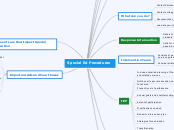Special Ed Procedures
General education teachers
Has most detailed knowledge of day to day strengths and weaknesses
Often is the first to bring to attention a student with special needs
Special Ed Teachers
Responsible for coordinating services children receives
Subtopic
School Psychologists
Determines a students intellectual, academic, social, emotional, and behavioral functioning
Design strategies to address the problem.
How do we decide if a need might be a disability?
Is there a chronic pattern?
Are the needs becoming more serious as time passes?
Is their behavior significantly different than that of other classmates?
What can you do?
Contact Parents
Contact colleagues
Document the need
evaluate your responses to the student
Response Intervention
Data is the basis for making decisions about students' functioning withing the curriculum.
Calls for the systematic use of intensive, research based interventions
Intervention Team
Consists of general education teacher, special services personnel, and an administrator.
Consider strategies for assisting the student
IEP
Includes detailed planning of the student's education and related services
Outlines all special education services the student is to receive
Present level of performance
Annual goals and short term objectives
Extent of participation
Modifications needed
Behavior intervention plan
Strategies for evaluation
Transition plan
Monitoring Special Education Services
Annual Reviews
Three Year Evaluations
Progress Reports
Due Process
Student placement and educational environment
Regular Classroom
Resource room
Separate Classes
Separate Schools
Residential facilities
Home and hospital settings
Types of Law that Impact Special Education
Statutory
Laws made by congress
Regulatory
Regulations added to statutory laws
Case
legal ruling the results of lawsuits
Important Acts and Court Cases
Education of all Handicapped Children Act
IDEA
PARC v Pennsylvania
Due Process
Mills V Board of Education
IDEA, FAPE
Rowley V BOE
FAPE
Daniel RR V Texas BOE
LRE
